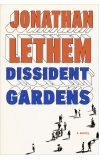
23 Jan 2014 02:47:17
One disappointment of John Lanchester's otherwise highly engaging Capital was the rather half-hearted whodunnit that knits together the inhabitants of the London road upon which the novel is set. A more ambitious (and more risky) approach would have done away with the demands of traditional narrative structure, allowing the geography of the road to dictate the plot of the novel much as Georges Perec used the architecture of a Parisian apartment block to shape his masterpiece, Life: A User's Manual. In Jonathan Lethem's Dissident Gardens any nods to traditional modes of plotting feel accidental. Instead, we have a series of loosely linked stories whose organising principle is a conception of history, a Weltanschauung. Last year, I gave lecture at Yasnaya Polyana, Tolstoy's former estate near Moscow. My speech was about politics and literature: novels, I argued, ought to rise above the grubby concerns of their day and rather find their political stance within the uniquely democratic act that is the writing of fiction. Lethem clearly wasn't listening. Dissident Gardens is stridently, unapologetically political. Over a span of almost a century and with a cast of richly drawn eccentrics, the novel's overlapping stories give us an alternative history of America, seen through the eyes of the radical left. Lethem's viewpoint is necessarily partisan, his position clear: in an era when the victory of selfish capitalism in the US is near-absolute, America is losing the ability to conceive of other modes of existence. In a world where history is written by the victors, this is an attempt to recuperate a lost narrative: the possibility of American communism.
At the novel's heart sits the matriarch Rose Angrush Zimmer, a "consummate enraged flaneur" and resident of a planned community in Queens, New York, called Sunnyside Gardens (Lethem has left his beloved Brooklyn, but he has not gone far). With Rose, her vampish daughter Miriam, and a host of other near and not-so-near friends and relatives, we step through the history of radical America. The novel opens in 1955, as Rose is expelled from the American Communist party, purportedly as a result of her affair with a black policeman. She meets her fall with bitter humour: "The true communist," she says, "always ends up alone." Through the 60s and 70s Miriam (a less angry version of Swede Levov from Philip Roth's American Pastoral) adopts her mother's mantle, although, as Cousin Lenny says to Rose: "You tried to change conditions for the working class and alter the doomed trajectory of civilisation. Your daughter just wants to put LSD in the water supply." The novel ends in the contemporary moment with the Occupy movement as the last bastion of a proud, doomed tradition.
Dissident Gardens has some obvious literary forebears – the now near-forgotten voices of early American socialism: Nelson Algren, Upton Sinclair and Michael Harrington's epic The Other America. Although here we find one of the problems in Lethem's project. The writers of the American left have historically concerned themselves with the lot of the working classes; of the many voices that Lethem uses to tell Dissident Gardens, all are educated, middle-class and knowing. We have Rose, the fiery autodidact; Miriam, a brainbox who skips ahead in school; Cicero Lookins, who is taken under Rose's wing and becomes a cynical professor at a New England college; Sergius Gogan, Miriam's son, a songwriter. It seems strange that a history of a movement that sought the emancipation of the proletariat should feature no proletarian voices. But this, perhaps, is Lethem's point: it was because socialism remained the preserve of the urban intelligentsia that it never gained a foothold in the States.
Another precursor is Roth's I Married a Communist. Both novels attempt to establish a counter-history of the American left, both novels see in Abraham Lincoln an early fellow traveller, or rather the kind of leader the left needed in the 20th century, but never had. The comparison again initially tells against Lethem. Roth's book is angry, bitter, brilliantly haunted by Senator McCarthy. It is contained and forceful in a way that Dissident Gardens, because of its massive scope, cannot be. There are some powerful episodes in Lethem's novel – Miriam's trip to Nicaragua, the letters between Miriam and her father, the strikingly effective ending – but others fall flat, stuffed as they are with dogma, speechifying and political niceties.
Lethem is to be applauded for the spirit behind this novel. It feels like an urgent and necessary message at a time when Wall Street is once again poised with its heel on the face of the 99% and even the young view Occupy, as one character notes of his students, "with the agnosticism they'd feel toward a social media site from which no peer had yet sent them an invite". In the end, though, politics trumps plot, and those who are looking for a madcap romp like Motherless Brooklyn or a heartwarming Bildungsroman like The Fortress of Solitude will be left educated, certainly, rather less entertained.

